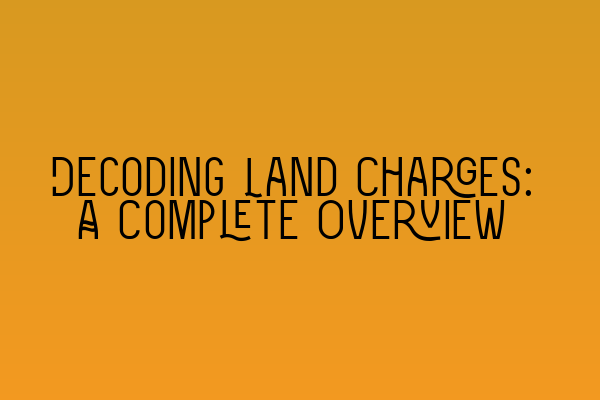Decoding Land Charges: A Complete Overview
When it comes to property transactions and land ownership in the United Kingdom, there are various legal considerations that need to be taken into account. One important aspect of this is understanding land charges and their implications. In this comprehensive guide, we will decode land charges and provide you with a complete overview of their significance in property law.
What are Land Charges?
In simple terms, land charges are restrictions or interests that are registered against a property or piece of land. They are recorded in the Land Charges Register, which is maintained by the Land Registry. The purpose of registering land charges is to provide public notice of any obligations or interests that may affect a property.
Land charges can be categorized into two main types: classifiable and non-classifiable charges. Classifiable charges include matters relating to bankruptcy, liquidation, and statutory charges. Non-classifiable charges refer to any other charges not falling within the classifiable charges category.
It’s essential to understand that land charges are different from other types of property interests, such as easements or mortgages. While easements and mortgages are registered against the title of the property, land charges are registered against the owner or occupier of the property. This means that even if the property is sold, the land charge remains with the current owner.
Types of Land Charges
There are various types of land charges that can be registered against a property. Here are some of the most common ones:
- Restrictive Covenants: These are obligations or restrictions imposed on the use of the property. They can include restrictions on building extensions, using the property for specific purposes, or preventing certain activities.
- Notices: Notices are registered to provide public notice of any pending actions, such as legal proceedings, enforcement actions, or the existence of certain rights.
- Local Land Charges: These are charges that are specific to a particular local area and are not classified under the classifiable charges. They can include matters such as planning permissions, tree preservation orders, or conservation area designations.
- Financial Charges: Financial charges include charges such as mortgages, loans, or other debts secured against the property. These charges give the lender the right to take possession of the property if the borrower fails to repay the debt.
Importance of Land Charges
Understanding land charges is crucial for both property buyers and sellers. For buyers, conducting a thorough investigation of the Land Charges Register is essential to identify any potential charges or restrictions that may affect their intended use of the property. This ensures that buyers are fully aware of any obligations or limitations associated with the property before completing the purchase.
For sellers, providing accurate and comprehensive information about land charges is equally important. Failure to disclose any relevant charges can result in legal disputes and potential liability for the seller in the future. It is therefore crucial for sellers to obtain an official copy of the Land Charges Register and provide it to the buyer during the transaction process.
Registering and Removing Land Charges
Registering a land charge is a formal process that involves submitting the appropriate application and fees to the Land Registry. The registration process ensures that the charge is properly recorded and can be easily accessed by anyone conducting a search on the property.
Removing a land charge can be more complex and may require the consent of the charge holder or a court order. For example, if a financial charge such as a mortgage has been fully repaid, the lender will need to provide a certificate of discharge to remove the charge from the Land Charges Register.
Conclusion
Land charges play a significant role in property transactions and land ownership in the United Kingdom. Understanding the different types of charges, their implications, and the process of registering and removing them is crucial for both buyers and sellers.
If you found this overview helpful, we recommend checking out our related articles for further insights into UK property laws, legal challenges in property transactions, lease laws, and exam preparation tips for land law:
- Updates in UK Property Laws: Key Changes and Implications
- Legal challenges in property transactions: A comprehensive guide
- Navigating Lease Laws in the UK: Essential Guidelines for Tenants and Landlords
- Dominate Property Law Questions: Avoiding Common Pitfalls
- Land Law Revision Tips: Ace Your Exam Preparation
